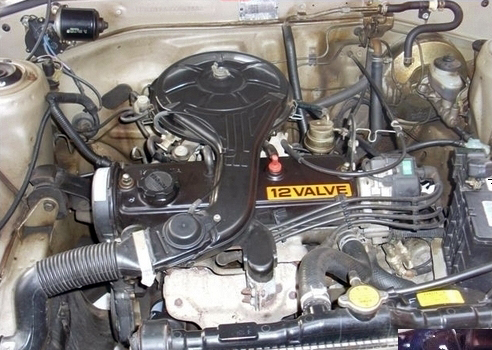Figure Out Reliable Toyota Tazz Engine for Sale: Auto Parts Depot
Figure Out Reliable Toyota Tazz Engine for Sale: Auto Parts Depot
Blog Article
Engine Acquiring Specialist Tips on Selecting the Right Engine for Your Particular Requirements
Selecting the best engine for your certain requirements involves a complex interplay of factors that go beyond plain horse power numbers. By diving right into the intricacies of power versus performance, evaluating gas ratings, and budgeting for long-lasting prices, one can genuinely optimize their engine selection.
Power Vs. Effectiveness: Discovering the Equilibrium

When selecting an engine, it is critical to strike an equilibrium in between power and performance to satisfy your certain needs effectively. Power describes the engine's capability to produce power for propulsion, establishing aspects like acceleration, towing ability, and general efficiency (Toyota Tazz Engine For Sale). On the various other hand, efficiency associates with exactly how well the engine utilizes gas to produce power, impacting aspects such as fuel economic situation and ecological friendliness
Accomplishing the right balance between power and effectiveness is vital because an engine that is also powerful might consume extreme fuel, causing greater operating expenses and unneeded stress on the setting. On the other hand, an engine that focuses on efficiency over power might result in slow efficiency, especially popular situations like pulling hefty tons or driving uphill.
To make an educated decision, think about factors such as your normal driving conditions, the designated usage of the car, and your individual preferences. By reviewing your concerns and needs, you can choose an engine that strikes the perfect balance in between power and performance, guaranteeing optimum performance while reducing ecological influence and operating prices.
Recognizing Engine Dimension and Kind

Furthermore, engine kind plays an essential function in establishing the efficiency characteristics of an engine. Typical engine kinds include inline engines, V engines, and rotary engines, each with its one-of-a-kind benefits and disadvantages. The engine kind influences variables such as the engine's dimension, weight circulation, and power delivery. Understanding the interplay between engine size and type is important in choosing an engine that lines up with your certain requirements and concerns, whether it be power, effectiveness, or a balance of both.
Consider Your Automobile's Needs
Considering your vehicle's requirements is a basic step in the engine option process to ensure optimum performance and capability. It is vital to evaluate aspects such as the intended use the vehicle, its weight, lugging capacity, and gas efficiency requirements. If you are looking for an engine for a durable vehicle that will certainly be used for towing, you will certainly require a powerful engine with high torque capacities. On the other hand, if you are choosing an engine for a portable vehicle largely used for city commuting, gas performance may be a much more crucial aspect to take into consideration.

Examining Gas Effectiveness Scores
Evaluating fuel efficiency rankings is an essential aspect of picking the appropriate engine for your lorry, making certain price financial savings and environmental sustainability. Fuel efficiency rankings, typically gauged in miles per gallon (MPG) for fuel engines or kilowatt-hours per 100 miles (kWh/100 miles) for electric engines, indicate how much an automobile can travel on a specific quantity of gas or electrical energy. Higher MPG or lower kWh/100 miles worths symbolize much more efficient engines, converting to decreased fuel prices and reduced carbon emissions.
Additionally, compare various engine options within the very same car course to identify the most cost-effective choice. Aspects such as engine dimension, weight, aerodynamics, and hybrid or electrical capabilities can all affect gas efficiency.
Budgeting for Long-Term Expenses
Strategically preparing for lasting costs is critical when selecting an engine, making sure economic sustainability over the vehicle's life expectancy. While the first purchase rate of an engine is a considerable factor, it is vital to think about the lasting expenses connected with maintenance, repair work, and fuel usage. Choosing for a much more fuel-efficient engine may have a greater upfront price yet can cause substantial savings in time. Normal maintenance, such as oil changes, filter replacements, and tune-ups, is important to keep the engine running smoothly and effectively, decreasing the danger of expensive repair work down the line.
Furthermore, researching the accessibility and price of substitute components for the selected engine is essential in budget plan planning. By thoroughly budgeting for these long-term costs and factoring them right into the decision-making process, people can select an engine that not just fulfills their immediate demands however also stays cost-effective throughout its life expectancy.
Verdict
In final thought, picking the best engine for your certain needs requires balancing power and performance, understanding engine size and kind, considering your lorry's requirements, assessing go gas effectiveness scores, and budgeting for lasting costs. By very carefully taking into consideration these factors, you can guarantee that you select an engine that satisfies your demands and gives optimum performance for your vehicle.
To even more fine-tune the choice process of an engine that strikes the ideal balance between power and effectiveness, it is crucial to dive right into the details of understanding engine size and kind. Engine dimension refers to the complete quantity of air and gas that can be pressed with the engine cylinders. Typical engine types include inline engines, V engines, and rotary engines, each with its unique advantages and drawbacks. Understanding the interaction in between engine a knockout post dimension and type is important in selecting an engine that aligns with your specific demands and top priorities, whether it be power, performance, or an equilibrium of both.
Gas effectiveness scores, commonly gauged in miles per gallon (MPG) for fuel engines or kilowatt-hours per 100 miles (kWh/100 miles) for electrical engines, suggest how far a lorry can take a trip Recommended Site on a details quantity of gas or power.
Report this page